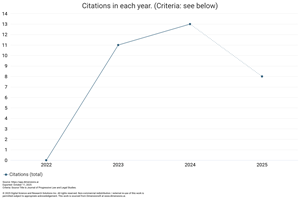Authority of Surabaya City Government regarding Amending Fund Budget of Village
DOI:
https://doi.org/10.59653/jplls.v2i02.629Keywords:
the village, fund budget of village, Amendment, Legal Conformity, TransparencyAbstract
The village is part of the Sub-district formed by Regency / City Regional Regulation led by a head called Head of Village as a Sub-district apparatus responsible to the District Head. The Head of Village is appointed by the Regent/Mayor on the proposal of the Regional Secretary and Civil Servants who meet the requirements by the provisions of the Laws and Regulations which assist the duties of the Sub-District Head in carrying out village government activities, carrying out community empowerment, implementing community services, maintaining public peace and order, and so on. The limits of the Surabaya City Government's authority in making changes to the Fund Budget of Village must be by Government Regulation Number 17 of 2018 Article 30 where changes to the Fund Budget of Village are not less than 5% of the Regional Revenue and Expenditure Budget after deducting the Special Allocation Fund. In addition, the determination and management of the Fund Budget of Village must be transparent, including when the Surabaya City Government makes changes, they must still be based on Government Regulation Number 17 of 2018 and Law Number 1 of 2022, wherein Law Number 1 of 2022 Article 173a states that the Government can require Regions to prioritize the use of budget allocations for specific activities (refocusing), changes in allocations, and changes in the use of the APBD, and the Government can adjust the maximum amount of the APBD deficit and Regional Debt Financing. Legal conformity in managing the Fund Budget of the Village has been stated in Law Number 23 of 2014, Article 1, Paragraph 47, and Law Number 130 of 2018, Article 1, Paragraph 8. Other legal conformity in managing the Fund Budget of Village is also stated in Government Regulation Number 17 of 2018 Article 30, Paragraphs 6 and 7, and in Law Number 1 of 2022 Article 1, Paragraph 75.
Downloads
References
Cakranegara, P. A., Rahadi, D. R., & Susilowati, E. (2023). Distribution of Authority for Mining Business Permits between the Central Government and Regional Governments After the Enactment of the Minerba Law Number 4 of 2009. Journal of Progressive Law and Legal Studies, 1(02). https://doi.org/10.59653/jplls.v1i02.46
Gunawan, D. R. (2016). Penerapan Sistem E-Budgeting Terhadap Transparansi Dan Akuntabilitas Keuangan Publik (Studi Pada Pemerintah Kota Surabaya). AKRUAL: Jurnal Akuntansi, 8(1). https://doi.org/10.26740/jaj.v8n1.p72-102
Kementrian Keuangan. (2023). “Direktorat Jenderal Perimbangan Keuangan-Siaran Pers-FGD Kebijakan Pengelolaan DAU Pendanaan Kelurahan Dan Pemadanan NIK-NPWP,.”
Mahsun, M. (2019). Konsep Dasar Penganggaran. Penganggaran Sektor Publik, 256.
Mashuri, M., Suwarno, S., & Pramono, T. (2020). Pengelolaan Dana Kelurahan Dalam Perspektif Community Driven Development. Jurnal Mediasosian : Jurnal Ilmu Sosial Dan Administrasi Negara, 4(1), 51–62. https://doi.org/10.30737/mediasosian.v4i1.819
Nababan, J. H., & Shahrullah, R. S. (2022). PERANAN OTONOMI DAERAH TERHADAP PEMBANGUNAN EKONOMI MELALUI PENGELOLAN KEUANGAN DAERAH. Journal of Law and Policy Transformation, 6(2). https://doi.org/10.37253/jlpt.v6i2.6322
Nur, S., & Susanto, H. (2020). Metode perolehan dan batas-batas wewenang pemerintahan. Online Administrative Law & Governance Journal, 3(3), 2621–2781.
Rahayu, T., Dahri, M., & Nugraha, B. (2023). Building a Cultural Model of Excellent Service at the Polytechnic Pelayaran Surabaya in welcoming the era of Society 5.0. International Journal of Multidisciplinary Approach Research and Science, 2(01 SE-Articles), 99–106. https://doi.org/10.59653/ijmars.v2i01.362
Peraturan Pemerintah Nomor 17 Tahun 2018 tentang Kecamatan, (2018).
RI, U. (2014). Undang-Undang Nomer 23 Tahun 2014 tentang Pemerintahan Daerah. Applied Microbiology and Biotechnology, 85(1), 2071–2079.
RI, U. (2022). Undang-undang Nomor 1 Tahun 2022. Lembaran Negara Republik Indonesia Nomor 6757, 104172, 1–143.
Sangki, A. A., Gosal, R., & Kairupan, J. (2017). “Penerapan Prinsip Transparansi Dan Akuntabilitas Dalam Pengelolaan Anggaran Pendapatan Dan Belanja Desa (Suatu Studi Di Desa Tandu Kecamatan Lolak Kabupaten Bolaang Mongondow).” JURNAL EKSEKUTIF, 1(1 SE-Articles).
Saragih, Y. M., Armanda, W., & Novaisal, A. (2023). Juridical Study on Abuse of Authority in Corruption Crimes: Analysis of Law No. 19 of 2019 concerning the Corruption Eradication Commission. Journal of Progressive Law and Legal Studies, 1(02). https://doi.org/10.59653/jplls.v1i02.92
Sempo, J. S., Laloma, A., & Londa, V. L. (2020). “Efektivitas Pengelolaan Dana Kelurahan Dalam Rangka Peningkatan Sarana Dan Prasarana Dan Pemberdayaan Masyarakat Di Kelurahan Bahu Kecamatan Malalayang Kota Manado.” JURNAL ADMINISTRASI PUBLIK, 6(95 SE-artikel), 61–73.
Sufa, S., Praratya, A., Sumartias, S., & Ahmad, J. (2020). Empowering Residents of The Former Dolly’s Prostitution Localization as an Effort of Government Economic Responsibility of Surabaya City. 1–7. https://doi.org/10.4108/eai.9-10-2019.2291101
Suwidyanti, N. (2023). PERAN GOOD GOVERNANCE MELALUI REFORMASI BIROKRASI DAN E-GOVERMENT GUNA MENINGKATKAN PENYELENGGARAAN PEMERINTAHAN BERBASIS KINERJA DI KOTA SURABAYA. Publik: Jurnal Manajemen Sumber Daya Manusia, Administrasi Dan Pelayanan Publik, 10(2). https://doi.org/10.37606/publik.v10i2.560
Unit Jaringan Dokumentasi dan Informasi Hukum BPK Perwakilan Provinsi Kalimantan. (2020). Pengelolaan Dana Pembangunan Sarana Prasarana dan Pemberdayaan Masyarakat di Kelurahan (Dana Kelurahan). Jurnal BPK Kalimantan Selatan, 1–10.
Downloads
Published
How to Cite
Issue
Section
License
Copyright (c) 2024 Fitri Yuliana, Rusdianto Sesung

This work is licensed under a Creative Commons Attribution-ShareAlike 4.0 International License.
Authors who publish with this journal agree to the following terms:
- Authors retain copyright and grant the journal right of first publication with the work simultaneously licensed under a Creative Commons Attribution-ShareAlike that allows others to share the work with an acknowledgement of the work's authorship and initial publication in this journal.
- Authors are able to enter into separate, additional contractual arrangements for the non-exclusive distribution of the journal's published version of the work (e.g., post it to an institutional repository or publish it in a book), with an acknowledgement of its initial publication in this journal.
- Authors are permitted and encouraged to post their work online (e.g., in institutional repositories or on their website) prior to and during the submission process, as it can lead to productive exchanges, as well as earlier and greater citation of published work (See The Effect of Open Access).
























